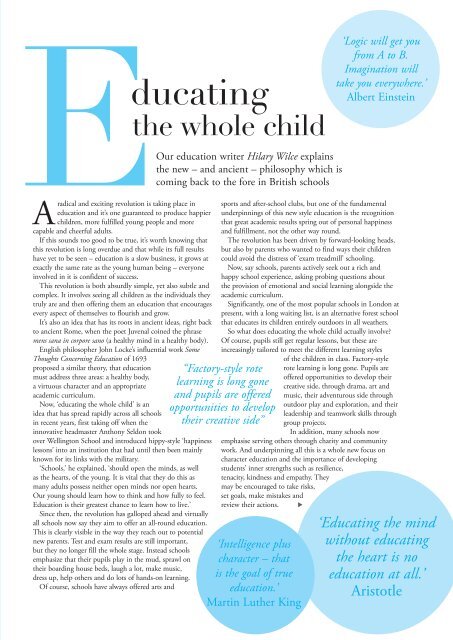Education | ED06 | Summer 2019
A Wealden Times & Surrey Homes Magazine
A Wealden Times & Surrey Homes Magazine
You also want an ePaper? Increase the reach of your titles
YUMPU automatically turns print PDFs into web optimized ePapers that Google loves.
ducating<br />
Ethe whole child<br />
A<br />
radical and exciting revolution is taking place in<br />
education and it’s one guaranteed to produce happier<br />
children, more fulfilled young people and more<br />
capable and cheerful adults.<br />
If this sounds too good to be true, it’s worth knowing that<br />
this revolution is long overdue and that while its full results<br />
have yet to be seen – education is a slow business, it grows at<br />
exactly the same rate as the young human being – everyone<br />
involved in it is confident of success.<br />
This revolution is both absurdly simple, yet also subtle and<br />
complex. It involves seeing all children as the individuals they<br />
truly are and then offering them an education that encourages<br />
every aspect of themselves to flourish and grow.<br />
It’s also an idea that has its roots in ancient ideas, right back<br />
to ancient Rome, when the poet Juvenal coined the phrase<br />
mens sana in corpore sano (a healthy mind in a healthy body).<br />
English philosopher John Locke’s influential work Some<br />
Thoughts Concerning <strong>Education</strong> of 1693<br />
proposed a similar theory, that education<br />
must address three areas: a healthy body,<br />
a virtuous character and an appropriate<br />
academic curriculum.<br />
Now, ‘educating the whole child’ is an<br />
idea that has spread rapidly across all schools<br />
in recent years, first taking off when the<br />
innovative headmaster Anthony Seldon took<br />
over Wellington School and introduced hippy-style ‘happiness<br />
lessons’ into an institution that had until then been mainly<br />
known for its links with the military.<br />
‘Schools,’ he explained, ‘should open the minds, as well<br />
as the hearts, of the young. It is vital that they do this as<br />
many adults possess neither open minds nor open hearts.<br />
Our young should learn how to think and how fully to feel.<br />
<strong>Education</strong> is their greatest chance to learn how to live.’<br />
Since then, the revolution has galloped ahead and virtually<br />
all schools now say they aim to offer an all-round education.<br />
This is clearly visible in the way they reach out to potential<br />
new parents. Test and exam results are still important,<br />
but they no longer fill the whole stage. Instead schools<br />
emphasize that their pupils play in the mud, sprawl on<br />
their boarding house beds, laugh a lot, make music,<br />
dress up, help others and do lots of hands-on learning.<br />
Of course, schools have always offered arts and<br />
Our education writer Hilary Wilce explains<br />
the new – and ancient – philosophy which is<br />
coming back to the fore in British schools<br />
sports and after-school clubs, but one of the fundamental<br />
underpinnings of this new style education is the recognition<br />
that great academic results spring out of personal happiness<br />
and fulfillment, not the other way round.<br />
The revolution has been driven by forward-looking heads,<br />
but also by parents who wanted to find ways their children<br />
could avoid the distress of ‘exam treadmill’ schooling.<br />
Now, say schools, parents actively seek out a rich and<br />
happy school experience, asking probing questions about<br />
the provision of emotional and social learning alongside the<br />
academic curriculum.<br />
Significantly, one of the most popular schools in London at<br />
present, with a long waiting list, is an alternative forest school<br />
that educates its children entirely outdoors in all weathers.<br />
So what does educating the whole child actually involve?<br />
Of course, pupils still get regular lessons, but these are<br />
increasingly tailored to meet the different learning styles<br />
of the children in class. Factory-style<br />
“Factory-style rote<br />
learning is long gone<br />
and pupils are offered<br />
opportunities to develop<br />
their creative side”<br />
‘Logic will get you<br />
from A to B.<br />
Imagination will<br />
take you everywhere.’<br />
Albert Einstein<br />
rote learning is long gone. Pupils are<br />
offered opportunities to develop their<br />
creative side, through drama, art and<br />
music, their adventurous side through<br />
outdoor play and exploration, and their<br />
leadership and teamwork skills through<br />
group projects.<br />
In addition, many schools now<br />
emphasise serving others through charity and community<br />
work. And underpinning all this is a whole new focus on<br />
character education and the importance of developing<br />
students’ inner strengths such as resilience,<br />
tenacity, kindness and empathy. They<br />
may be encouraged to take risks,<br />
set goals, make mistakes and<br />
review their actions. <br />
‘Intelligence plus<br />
character – that<br />
is the goal of true<br />
education.’<br />
Martin Luther King<br />
‘Educating the mind<br />
without educating<br />
the heart is no<br />
education at all.’<br />
Aristotle<br />
11 wealdentimes.co.uk


















